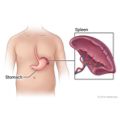Our Health Library information does not replace the advice of a doctor. Please be advised that this information is made available to assist our patients to learn more about their health. Our providers may not see and/or treat all topics found herein.
Topic Contents
Mononucleosis (Mono)
Condition Basics
What is mononucleosis (mono)?
Mononucleosis (mono) is a common illness caused by a virus. It can start with a sore throat and swollen glands. And then it can leave you feeling tired and weak for weeks or months. Mono goes away on its own, but rest and good self-care can help you feel better.
What causes mono and how does it spread?
The virus that usually causes mono—the Epstein-Barr virus (EBV)—can be spread through:
- Intimate contact or sharing of saliva. (A brief kiss on the lips isn't likely to spread EBV. It's spread when saliva from an infected person gets into another person's mouth.)
- Mucus from the nose and throat, and sometimes tears.
- Sharing things like drinking glasses, eating utensils, or toothbrushes with a person who is infected with EBV.
EBV isn't spread by casual contact. You can live in the same house with a person who has mono and never be infected with the virus. But a person who has a weakened immune system may be at higher risk for mono.
You can pass EBV to others for several weeks or months during and after the time you are first infected with EBV. The virus can also become active and spread to others from time to time throughout your life.
What are the symptoms?
The most common symptoms of mono include fever, sore throat, swollen lymph nodes, and feeling tired and weak. Mono can also cause pain in the upper left part of your belly, which may mean that the spleen is enlarged. Symptoms usually start 4 to 6 weeks after you're exposed to the virus.
How is it diagnosed?
Your doctor will ask you questions about your symptoms and possible exposure to mono. Your doctor will also examine you for signs of mono. This may include looking at your throat, checking your skin, and pressing on your belly.
Blood tests to help confirm the diagnosis include:
- Mono tests (including the rapid mono test and EBV antibody test). It's possible for the rapid mono test to come back negative early in the course of the infection (false negative).
- Complete blood count. This may be done to help rule out other infections or complications of mono.
Other tests may be done if complications of mono occur or if the mono tests are negative.
- Liver tests may be done to find out if the virus has affected your liver.
- If the mono test is negative, your doctor may test you to check if you are infected with human immunodeficiency virus (HIV), cytomegalovirus (CMV), or other organisms. HIV and CMV can cause an illness that's like mono.
How is mono treated?
Treatment for mono usually involves self-care measures like rest and over-the counter medicines to reduce pain and fever. In severe cases, corticosteroids may be used to reduce swelling of the throat, tonsils, or spleen.
How can you care for yourself at home?
Here are some things you can do to ease mono symptoms.
- Get plenty of rest. Stay in bed until you feel well enough to be up.
- Drink plenty of fluids.
- For a sore throat, suck on lozenges or gargle with salt water. To make salt water, mix 1 teaspoon of salt in 8 ounces of warm water.
- Take an over-the-counter pain medicine, such as acetaminophen (Tylenol), ibuprofen (Advil, Motrin), or naproxen (Aleve), for a sore throat or headache or to lower a fever.
When you have mono:
- Don't play contact sports for 4 weeks. Don't lift anything heavy. Too much activity increases the chance that your spleen may break open (rupture).
- Try not to spread the virus. Don't kiss and don't share dishes, glasses, eating utensils, or toothbrushes for at least a few weeks.
- If you know you have mono, don't donate blood. There's a chance of spreading the virus through blood products.
Related Information
Credits
Current as of: September 10, 2024
Author: Ignite Healthwise, LLC Staff
Clinical Review Board
All Ignite Healthwise, LLC education is reviewed by a team that includes physicians, nurses, advanced practitioners, registered dieticians, and other healthcare professionals.
Current as of: September 10, 2024
Author: Ignite Healthwise, LLC Staff
Clinical Review Board
All Ignite Healthwise, LLC education is reviewed by a team that includes physicians, nurses, advanced practitioners, registered dieticians, and other healthcare professionals.
This information does not replace the advice of a doctor. Ignite Healthwise, LLC disclaims any warranty or liability for your use of this information. Your use of this information means that you agree to the Terms of Use and Privacy Policy. Learn how we develop our content.
To learn more about Ignite Healthwise, LLC, visit webmdignite.com.
© 2024-2025 Ignite Healthwise, LLC.





